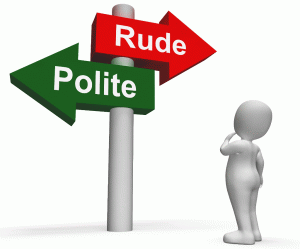 Consider the tone of your message. Tone is the relationship the writer sets up with the reader. Even though email is a friendly medium, it’s tough to make humor (especially humor clothed in sarcasm) or tongue-in-cheek comments work in email, and it’s best to avoid them. Also avoid personal comments about others, or knee-jerk emotional responses – email is no place for sarcasm, hostility, cynicism, or whining.
Consider the tone of your message. Tone is the relationship the writer sets up with the reader. Even though email is a friendly medium, it’s tough to make humor (especially humor clothed in sarcasm) or tongue-in-cheek comments work in email, and it’s best to avoid them. Also avoid personal comments about others, or knee-jerk emotional responses – email is no place for sarcasm, hostility, cynicism, or whining.
Remain professional at all times. Consider waiting a bit before emailing a “sensitive” message. Avoid “venting,” vulgarity, or certainly, any kind of profanity. Think about your corporate culture, or prevailing attitude – which can be especially critical for emails to co-workers.
If you receive an email that you cannot answer immediately – perhaps one requesting information requiring research, or an answer that needs more time to put together, let your reader know right away that you have received his or her message, that you are, or will be working on it, and approximately when you will be able to respond.
Allow sufficient time. Your email could be received within minutes – or hours. Even though your system may interrupt to announce a new message, it’s best to avoid time-sensitive communications (e.g., announcing a staff meeting in half an hour). Email is designed for convenience, not necessarily for immediacy.
Remember that email is a two-way communication. Consider what your reader has to say on an issue. Do not assume that no answer means agreement – or even understanding.
On deadline issues, ask for the follow-up, confirmation, or answers you need by a certain date. If you get no acknowledgement, follow up until you do. Consider international time differences, and take cultural expectations and practices into account when emailing internationally. Here’s an interesting comment we hear often: If everything you write is “important,” with a deadline attached, the reader may tend to discount the importance of anything you write.